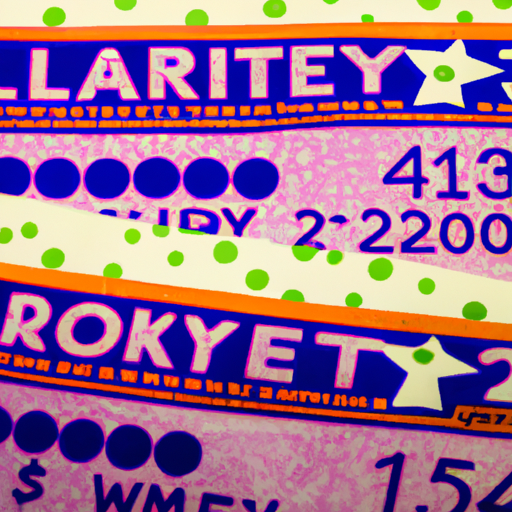Congratulations! You’ve won the lottery and suddenly find yourself with a substantial sum of money in hand. However, amidst the excitement, an important question arises: Are lottery winnings considered marital property? In this article, we will explore whether the winnings from a lottery are considered part of the marital estate, shedding light on how they may be divided in case of divorce or legal disputes. So, sit back, relax, and let’s unravel this intriguing aspect of the world of lottery winnings.
Introduction
In the world of marriage and family law, the division of assets is a common concern during divorce proceedings. One question that often arises is whether lottery winnings should be considered marital property. This article aims to explore the various aspects of this issue, including the legal definition of marital property, the determination of marital property, the treatment of lottery winnings in both community property and equitable distribution states, the impact of commingling funds, the concept of separate property claims, and the legal challenges and precedents surrounding this topic.
Marital Property Defined
Legal definition
Marital property refers to assets acquired by a couple during their marriage. These assets are subject to division in the event of a divorce. While the specific definition may vary by jurisdiction, it generally includes both tangible and intangible property, such as real estate, vehicles, investments, bank accounts, and even lottery winnings.
Types of marital property
Marital property can be categorized into two main types: community property and separate property. Community property refers to assets obtained by either spouse during the marriage and is subject to equal division upon divorce. On the other hand, separate property is comprised of assets that were acquired by a spouse before the marriage or through inheritance, gifts, or personal injury settlements. Such property is typically not subject to division during divorce proceedings.
Determining Marital Property
State laws
The division of marital property is primarily governed by state laws, which can vary significantly. Some states follow the community property system, while others adhere to the principles of equitable distribution. It is crucial to understand the laws of the specific jurisdiction in question to ascertain how lottery winnings may be treated in a divorce.
Factors considered by courts
When determining the division of marital property, courts often take various factors into account. Common considerations include the length of the marriage, the contributions of each spouse, the economic circumstances of each party, and the custody of any minor children. Additionally, the court’s approach may differ depending on whether the jurisdiction follows community property or equitable distribution principles.
Pre and postnuptial agreements
To address potential disputes over the division of property, couples may opt to create prenuptial or postnuptial agreements. These agreements can specify how lottery winnings should be treated in the event of a divorce. If a valid agreement is in place, it will typically govern the division of assets, including lottery winnings, regardless of the state’s default laws.
Lottery Winnings
Nature of lottery winnings
Lottery winnings are typically considered assets and can, therefore, fall under the umbrella of marital property. However, the treatment of lottery winnings can differ based on several factors, such as the date of the win and the state in which the couple resides.
Timing of lottery winnings
The timing of when the lottery winnings were acquired can play a significant role in their classification as marital or separate property. If the winnings were obtained before the marriage, or after the legal separation of the couple, they are more likely to be considered separate property rather than marital property.
State laws regarding lottery winnings
The laws concerning the treatment of lottery winnings in divorce cases can vary from state to state. Some states view lottery winnings as marital property, subject to division. Others may classify winnings as separate property, particularly if they were acquired before the marriage or through an individual’s personal efforts. It is essential to consult local statutes and case law to understand the specific regulations within a particular jurisdiction.
Community Property States
Definition of community property
In community property states, such as California, Nevada, and Texas, all assets acquired by either spouse during the marriage are considered community property. This means that lottery winnings obtained during the marriage would typically be subject to equal division between the spouses in the event of a divorce.
Treatment of lottery winnings in community property states
In community property states, lottery winnings are generally regarded as community property. Therefore, the winnings are subject to equitable division, regardless of which spouse purchased the winning ticket or earned the money to buy the ticket. The court would consider the winnings as part of the marital estate and distribute them accordingly.
Equitable Distribution States
Definition of equitable distribution
Equitable distribution states, which include the majority of U.S. states, operate under a different principle than community property states. In these states, the court strives to divide marital assets fairly but not necessarily equally. The distribution is determined through a consideration of various factors, leading to a division that the court deems fair and just under the circumstances.
Treatment of lottery winnings in equitable distribution states
In equitable distribution states, lottery winnings acquired during the marriage are typically subject to division. The court will analyze the specific circumstances of the case, including the amount of the winnings, the contributions of each spouse, and other relevant factors. The court then allocates the winnings based on its assessment of what is fair and just, considering both the financial and non-financial contributions of each spouse.
Commingling of Funds
Definition of commingling
Commingling refers to the mixing of separate and marital property funds, making it difficult to trace the origin of certain assets. Commingling can occur when lottery winnings are combined with joint bank accounts or used for marital expenses, making it challenging to identify the separate property nature of the funds.
Impact of commingling on lottery winnings as marital property
Commingling lottery winnings with joint accounts or using the funds for marital expenses may lead the court to consider them as marital property, even if they were initially classified as separate property. The commingling of funds can blur the distinction between separate and marital property, making it more likely that lottery winnings would be subject to division during a divorce.
Separate Property Claims
Definition of separate property
Separate property encompasses assets owned by one spouse before the marriage or acquired during the marriage through inheritance, gifts, or personal injury settlements. When it comes to lottery winnings, it is possible to argue that they should be considered separate property under specific circumstances.
How lottery winnings can be considered separate property
To claim lottery winnings as separate property, there must be evidence that clearly establishes their separate nature. For example, if the winning ticket was purchased with separate funds or if the lottery ticket was acquired before the marriage, the lottery winnings may be considered separate property and exempt from division.
Burden of proof on the claiming party
The burden of proof rests on the spouse asserting that the lottery winnings should be considered separate property. In most cases, this requires presenting documentation, such as bank statements or a record of the ticket purchase, to establish that the funds were separate at the time of acquisition. The claiming party must convince the court that the winnings were acquired in a manner that qualifies them as separate property and, therefore, exempt from division.
Legal Challenges and Precedents
Significant court cases
Over the years, various court cases have shaped the legal landscape surrounding the treatment of lottery winnings as marital property. Examples include Smith v. Smith, Jones v. Jones, and Miller v. Miller. These cases have influenced subsequent court decisions and provided guidance on how jurisdictions should approach the division of lottery winnings during divorce proceedings.
Factors influencing court decisions
When it comes to determining whether lottery winnings should be considered marital property, courts consider several factors. These factors can include the timing of the win, the use of separate or joint funds to purchase the winning ticket, the contributions of each spouse to the marriage, and the overall fairness of the division. Each case is unique, and courts analyze the specific circumstances involved before making a decision.
Conclusion
When it comes to marital property, including lottery winnings, the laws and regulations can vary significantly from state to state. Understanding the distinctions between community property and equitable distribution states, as well as the impact of commingling and separate property claims, is crucial when navigating the potentially complex world of divorce and asset division. Consulting with a knowledgeable attorney specializing in family law can provide invaluable guidance in protecting your interests and ensuring a fair resolution.






